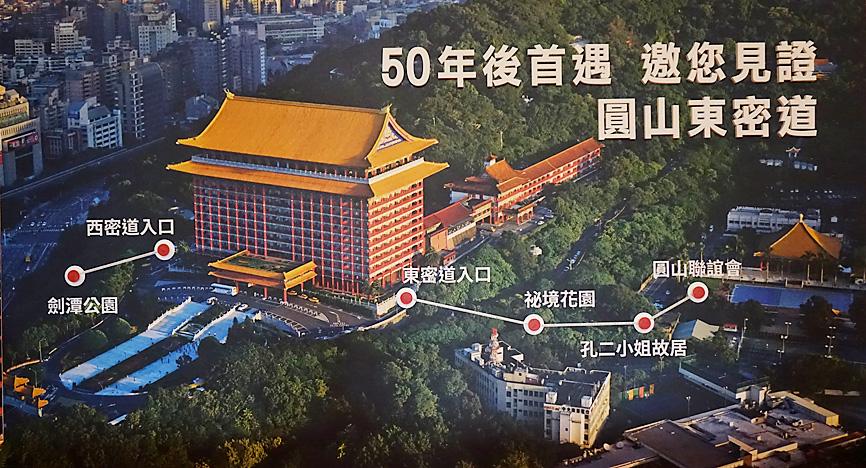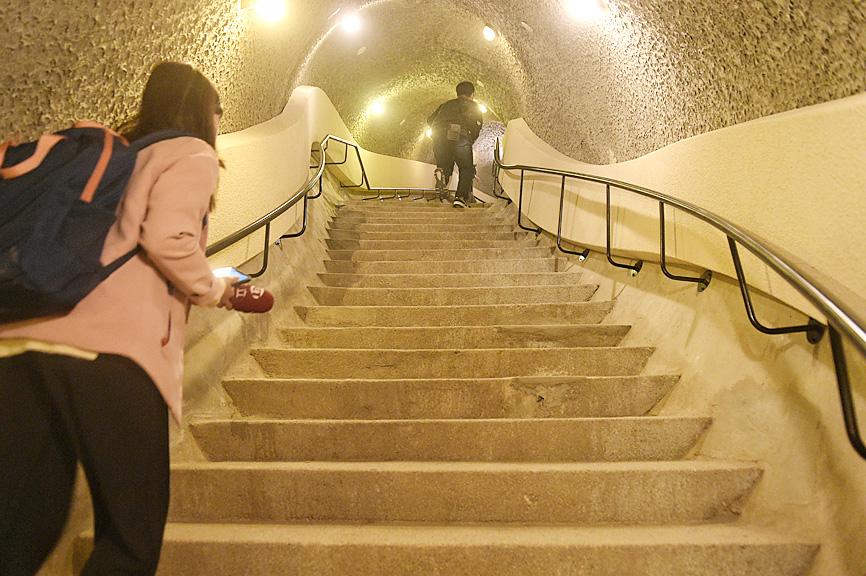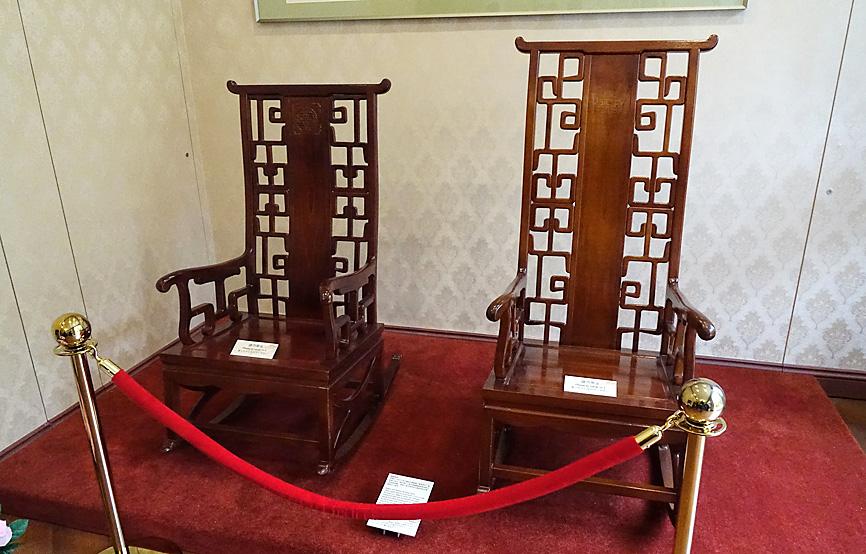An underground tunnel in the east wing of the Grand Hotel in Taipei that once served as an emergency exit for former president Chiang Kai-shek (蔣介石) was yesterday opened to the public for the first time since it was built 50 years ago.
A passage in the west wing of the hotel has been open since September 2019, drawing more than 50,000 visitors within three months of its opening. Last year, about 170,000 visited the west tunnel, the hotel said.
As tours of the west tunnel were warmly received, the hotel began renovating the east passage more than a year ago to open it to the public, it said.

Photo: Chang Chia-ming, Taipei Times
With the opening of the once-secret passages to guided tours, travelers can better understand the history of the Grand Hotel, it added.
The tunnels, designed to evacuate Chiang and his guests in the event of an emergency, were added to the hotel’s plans in 1970, when construction had begun on the main building, the hotel said, adding that it is the only international hotel with such passages.
In addition to its main architect, Yang Cho-cheng (楊卓成), the hotel invited a German-American engineer with extensive experience in building military bunkers during World War II to design the tunnels, it said.

Photo: Chang Chia-ming, Taipei Times
Visitors to the 67m-long east passage first descend an 84-step staircase before continuing down the tunnel.
The spiral passage helps protect evacuees from attackers and bullets, the hotel said.
Walls inside the tunnel have an uneven surface to absorb sound, it said, adding that 43 explosion-proof lamps were installed to prevent injuries from glass shards during evacuation.

Photo: Chang Chia-ming, Taipei Times
The passage leads to a garden, which was previously the site of a Japanese temple. The former residence of Kung Lin-wei (孔令偉), who was the hotel’s first manager and a niece of Soong Mayling (宋美齡), Chiang’s wife, was at the end of garden, the hotel said.
As people are also curious about Kung’s mysterious lifestyle, the residence would also be opened to visitors for the first time, it added.
The 85m-long west passage has a 20m-long slide next to the staircase, which was used to evacuate anyone unable to use the stairs.
For the east passage’s opening, the hotel created seven state banquet menus from the more than 200 dishes it has prepared for presidents, from Chiang to President Tsai Ing-wen (蔡英文).
A historic tour package is available, which includes a visit to the east passage, the Chiang Kai-shek Shilin Residence in Taipei’s Shilin District (士林) and National Revolutionary Martyrs’ Shrine, along with a presidential meal set and accommodation at the hotel.
The east passage would initially be limited to customers joining as part of historical tours, corporate customers and state banquet diners, due to the passage’s limited capacity, the hotel said.

The Coast Guard Administration (CGA) yesterday said it had deployed patrol vessels to expel a China Coast Guard ship and a Chinese fishing boat near Pratas Island (Dongsha Island, 東沙群島) in the South China Sea. The China Coast Guard vessel was 28 nautical miles (52km) northeast of Pratas at 6:15am on Thursday, approaching the island’s restricted waters, which extend 24 nautical miles from its shoreline, the CGA’s Dongsha-Nansha Branch said in a statement. The Tainan, a 2,000-tonne cutter, was deployed by the CGA to shadow the Chinese ship, which left the area at 2:39pm on Friday, the statement said. At 6:31pm on Friday,

The Chinese People’s Liberation Army Navy’s (PLAN) third aircraft carrier, the Fujian, would pose a steep challenge to Taiwan’s ability to defend itself against a full-scale invasion, a defense expert said yesterday. Institute of National Defense and Security Research analyst Chieh Chung (揭仲) made the comment hours after the PLAN confirmed the carrier recently passed through the Taiwan Strait to conduct “scientific research tests and training missions” in the South China Sea. China has two carriers in operation — the Liaoning and the Shandong — with the Fujian undergoing sea trials. Although the PLAN needs time to train the Fujian’s air wing and

Taiwanese celebrities Hank Chen (陳漢典) and Lulu Huang (黃路梓茵) announced yesterday that they are planning to marry. Huang announced and posted photos of their engagement to her social media pages yesterday morning, joking that the pair were not just doing marketing for a new show, but “really getting married.” “We’ve decided to spend all of our future happy and hilarious moments together,” she wrote. The announcement, which was later confirmed by the talent agency they share, appeared to come as a surprise even to those around them, with veteran TV host Jacky Wu (吳宗憲) saying he was “totally taken aback” by the news. Huang,

The American Institute in Taiwan (AIT) put Taiwan in danger, Ma Ying-jeou Foundation director Hsiao Hsu-tsen (蕭旭岑) said yesterday, hours after the de facto US embassy said that Beijing had misinterpreted World War II-era documents to isolate Taiwan. The AIT’s comments harmed the Republic of China’s (ROC) national interests and contradicted a part of the “six assurances” stipulating that the US would not change its official position on Taiwan’s sovereignty, Hsiao said. The “six assurances,” which were given by then-US president Ronald Reagan to Taiwan in 1982, say that Washington would not set a date for ending arm sales to Taiwan, consult